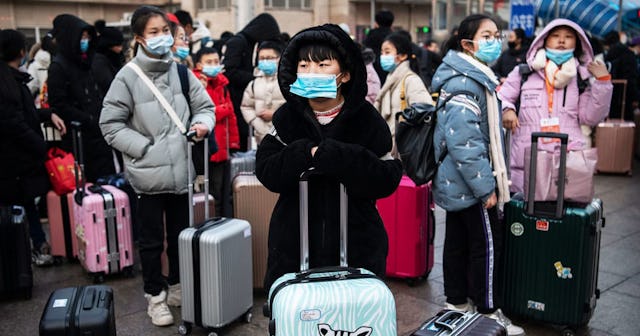How The Coronavirus Is Exposing Your Racism

You’ve probably heard several things about the coronavirus. You know it originated in China, in the Wuhan province. You’ve probably heard that it’s zoonotic, meaning that it can jump from humans to animals (much like bird flu or swine flu, according to the WHO). You’ve probably heard it’s devastating China. To date, mainland China has experienced more than 28,018 known infections of coronavirus, says the New York Times, along with at least 563 deaths, amounting to a 2% mortality rate. You’ve also heard that it’s jumped to the US: there have been, so far, 12 confirmed cases of the disease in the US.
You’ve also might have heard a lot of inaccurate statements, like the coronavirus came about because Chinese people eat food that Americans consider strange, like bats or civet cats. You’ve might have heard the coronavirus started in one of the so-called “wet markets” in China where live animals are kept in close proximity and sold outright or slaughtered on-site. You’ve could have heard Trump imposed a travel ban to China: foreign nationals who’ve been in China within the last 14 days won’t be allowed to enter the US. And you’ve heard jokes, seen memes, or made comments about the Chinese eating dogs, cats, bats, and any number of exotic foods.
People are joking that it’s called the ‘Kung Flu’ and other such trivializing nonsense.
Guess what? All these things are racist.
Anthony Kwan/Getty
In fact, scientists have noted that while wet markets may be a possible vector, it’s not the definitive cause, says The Verge. The WHO is discouraging travel and trade bans. The things you’ve heard actually stem not from fact, but from racism against folks from China (and Asians in general). All those jokes about Chinese people eating bat soup and causing the coronavirus? Your racism is showing.
The Verge tells us there’s little scientific evidence that travel bans stop the spread of a new virus; they can actually hinder efforts to stop the virus because of the “massive social disruption and intensive use of resources required,” says the WHO. Travel and trade bans take an economic toll on a country — and make it less likely they’ll report novel diseases in the future.
But it’s not just the president’s racism that’s showing when he halted travel between US and China. The University of California-Berkeley, usually seen a bastion of far-left liberalism, actually issued a statement, according to the LA Times, saying that xenophobia against Asians and Chinese are “a common reaction” to the coronavirus: people may feel “fears about interacting with people from Asia and guilt about these feelings.”
Um, wow.
The university eventually removed the post, but racism against Chinese — and those perceived as Chinese — continues unabated. Freaking out because you see an Asian person in a face mask? That’s racist. There’s a long history of Asians wearing face masks in public, says Quartz. It’s mostly related to practices in Chinese Traditional Medicine that hold that a person’s qi is affected by noxious winds, and both pollution — rampant in China — and exposure to disease can weaken the body’s defensive systems.
People aren’t wearing face masks because they have coronavirus, people.
One woman tells the LA Times that, while boarding a flight from Houston to San Diego while wearing a face mask, a TSA agent sneered at her “I hope you’re not sick.” And within an hour of news of the virus, a Slate reporter said they saw a friend comment on Facebook about fears her family may come down with the virus because they recently attended a conference where there were “many” Chinese people.
Two Chinese freshman at a Boston high school told The Boston Globe that their schoolmates have ramped up racist remarks, saying they “eat dog.” The Globe notes that “misleading” information is rampant on TikTok and racist sentiment abounds on Twitter.
There’s a long history of considering Chinese people “dirty and disease-ridden,” says Slate. This comes partly from early Chinese immigration to the United States, when, forced to live in miserable, cramped quarters without access to adequate medical care, immigrants (logically) became ill. The sentiment continues through American history. During the outbreak of bubonic plague in the 1900s, and the recent SARS outbreak, people avoided Chinese establishments — with devastating economic consequences.
Bottom line: if you spread rumors that Chinese people “caused” the virus through their eating habits, that’s racist. It’s also victim-blaming. If you look askance at Asian people and intentionally avoid them, or intentionally avoid Chinese restaurants, you’re being racist. If you use the coronavirus to justify using ethnic slurs, you’re racist.
Kevin Frayer/Getty
And being a racist a-hole won’t stop you from getting the coronavirus, so calm the hell down. What will help you avoid it, Slate tells us the CDC says: the same things that stop you from getting a known virus. Wash your damn hands, and don’t put your dirty hands near your mouth, nose, eyes, or face. Period. You’re no more likely to get coronavirus from a Chinese restaurant than you are anywhere else.
So wash your hands, use hand sanitizer, and stop being racist.
This article was originally published on